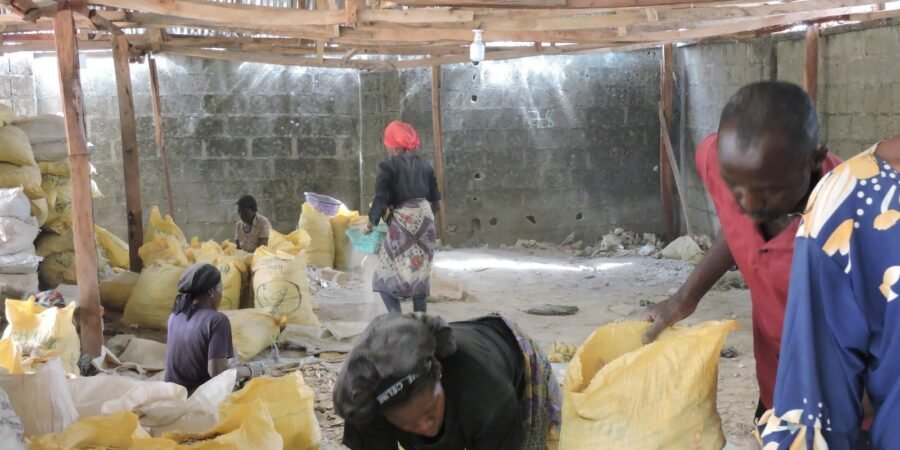Nigeria is blessed with a treasure trove of natural resources, has long relied on the extraction and export of raw minerals as a cornerstone of its economy. But while digging up gemstones, tantalite, tin, lithium ore and pumping out oil has generated revenue, it hasn’t always translated into prosperity for the majority. The true wealth lies not just in what we pull from the ground, but in what we can create from it. This is where the transformative potential of mineral processing comes in.
Instead of simply shipping off tones of unrefined ores, imagine a future where Nigeria stands as a regional hub for mineral processing and manufacturing. Visualize a Nigeria not just exporting iron ore, but using it to produce steel for manufacturing, construction, and infrastructure. Picture bustling gem cutting and jewelry making centers, factories transforming bauxite into aluminum sheets, tantalite into tantalum capacitors, and kaolin into high-quality ceramics. This shift unlocks a wealth of opportunities, creates wealth, reduces unemployment and diversifies the economy.
Benefits of a Developed Mineral Processing Industry in Nigeria:
- Economic Diversification: Moving beyond raw material exports reduces Nigeria’s dependence on volatile global commodity prices and fosters a more resilient economy. We can create and capture more value within Nigeria, interconnect and integrate different sectors of the economy, generating higher returns and fueling sustainable development.
- Job Creation: Mineral processing and manufacturing are inherently labor-intensive, creating new jobs for a range of skill levels. From engineers and technicians to welders and other workers, a thriving processing industry can offer meaningful employment and boost incomes across the country. Processing and manufacturing actually create significantly more jobs than extraction.
- Industrial Development: Processing and manufacturing spawn a web of supporting industries, from logistics and warehousing to equipment suppliers and waste management. This diversification strengthens the overall industrial base and attracts further investment.
- Technology transfer and skills development: Building a processing industry fosters technology transfer and the development of a skilled workforce, driving innovation and long-term economic growth. This can spill over into other sectors, driving overall economic growth and competitiveness.
- Enhanced export competitiveness: Finished products command higher prices and offer greater export competitiveness compared to raw materials.
- Local content development: By processing minerals within Nigeria, the country can build its own industrial base and reduce reliance on imported finished goods. This creates a virtuous cycle of investment and development, interconnecting and integrating the economy.
Opportunities Await: Mineral Processing Potential in Nigeria
Nigeria’s mineral landscape presents a diverse canvas for processing opportunities. Consider these examples:
- Gold refining: Nigeria’s abundant gold reserves can be refined into jewelry, bullion, and even high-tech components.
- Aluminum smelting: Bauxite deposits can be transformed into aluminum used in construction, transportation, and consumer goods.
- Steel production: Iron ore can be converted into steel for infrastructure projects, machinery, and automobiles.
- Gemstone cutting and polishing: Nigeria’s diverse gemstones like sapphires, tourmalines, amethyst, aquamarine, emerald and topaz can be cut and polished for the global jewelry market.
- Tantalum Processing: Nigeria boasts some of the world’s largest tantalum deposits. This “miracle metal” is vital for electronic components like capacitors found in smart phones, airplanes, and medical devices. Refining tantalum domestically could position Nigeria as a key player in the high-tech sector.
- Tin Recycling and Smelting: Nigeria has a long history of tin mining, but much of the valuable metal ends up in waste electronics. Establishing local recycling and smelting facilities could create a sustainable closed-loop system, boosting resource efficiency and generating additional income.
- Kaolin Processing: This versatile clay finds application in ceramics, paper, and plastics. With abundant kaolin reserves, Nigeria could develop a thriving processing industry catering to diverse domestic and international markets.
- Lime Production: Limestone, readily available in Nigeria, can be processed into lime, a crucial ingredient in construction materials, agriculture, and environmental remediation. Building lime production capacity would support various industries and infrastructure projects.
- Salt Iodization and Processing: Nigeria imports most of its iodized salt, despite having vast salt resources. Setting up domestic iodization facilities and expanding salt processing for industrial uses could enhance food security and generate economic benefits.
- Gypsum Board Manufacturing: Gypsum, another abundant mineral in Nigeria, can be used to produce lightweight and fire-resistant building materials like drywall. A domestic gypsum board industry could drive down construction costs and boost the real estate sector.
- Quartz Sand Processing: High-purity quartz sand is essential for glass manufacturing, electronics, and water filtration. With its own sand resources, Nigeria could develop a processing industry catering to these crucial sectors.
- Industrial Mineral Production: From silica sand for abrasive blasting to feldspar for ceramics, Nigeria has a wealth of industrial minerals with diverse applications. Processing these minerals for domestic and international markets could unlock significant economic potential.
- Specialty Mineral Extraction and Refining: Rare earth elements (REEs) and other critical minerals are increasingly important for clean energy technologies. Exploring and refining these specialty minerals in Nigeria could position the country as a vital supplier in the future green economy.
- Mineral Aggregates Processing: Crushed stones, gravel, and sand for construction purposes are often sourced from local quarries. Investing in modern processing and value-adding techniques for these aggregates could improve quality, reduce environmental impact, and create jobs in the construction sector.
These are just a few examples, and the possibilities are endless. By exploring the full potential of its mineral wealth through domestic processing and manufacturing, Nigeria can truly unlock a brighter future for its economy and its people.
Challenges and Solutions to Building a Robust Mineral Processing Industry in Nigeria
The road to a thriving processing industry isn’t without its bumps. Challenges include:
- Lack of infrastructure: Reliable power, transportation, and water supply are crucial for processing plants.
- Technological gaps: Access to advanced processing technologies and expertise is necessary.
- Financing constraints: Building modern processing plants requires significant investment, often exceeding the reach of individual businesses.
- Policy and regulatory hurdles: Streamlining regulations and providing incentives for investors is essential.
Solutions lie in:
- Public-private partnerships: Collaboration between government and private sector can bridge infrastructure and financing gaps.
- Technology partnerships: Collaboration with foreign companies can provide access to technology and expertise.
- Skills development programs: Investing in training programs to create a skilled workforce for the processing industry.
- Supportive policies: Creating tax breaks, subsidies, and special economic zones to attract investment.
So, how can we overcome these challenges and turn the dream into reality? Inspiration can be found in success stories from around the world:
Nigeria isn’t alone in its quest for a downstream mineral revolution. Countries like Botswana and South Africa have successfully transitioned from raw material exporters to processing powerhouses. Botswana’s diamond cutting and polishing industry is a prime example, creating thousands of jobs and generating significant revenue. South Africa’s platinum group metals processing sector demonstrates the potential for high-value mineral beneficiation.
Ethiopia is another example. The Addis Ababa Aluminum Production Plant, built with Chinese partnership, transforms locally mined bauxite into aluminum ingots, supplying the domestic construction industry and generating export revenue.
Another country worthy of mentioning is Indonesia. The PT Timah Smelter on Belitung Island refines locally mined tin ore, creating high-value tin ingots for export and contributing to local job creation.
These examples showcase the transformative power of investing in mineral processing. For Nigeria, the benefits are clear – economic diversification, job creation, and industrial development. By addressing the challenges and learning from global experiences, we can unlock the true potential of our mineral wealth, not just extracting value from the ground, but creating it within our borders.
So, let’s move beyond extraction. Let’s embrace the value chain of mineral processing and manufacturing, shaping a future where Nigeria’s natural resources fuel not just revenue, but the nation’s prosperity. The time to start this transformation is now.
READ Also:
Need a Mining License or Mineral Trade Permit in Nigeria? Here’s How We Can Help





Leave a Reply